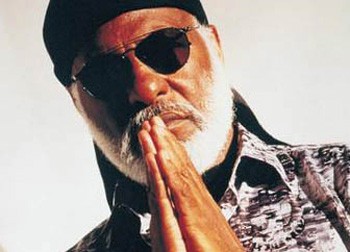Mighty Man: Mo Rodgers knows the spiritual side of the blues.
Into the Light
Rodgers and Williams return to the blues
By Greg Cahill
In the wake of Eric Clapton’s recent tepid tribute to blues great Robert Johnson, Me and Mr. Johnson (Reprise), the rock legend’s first all-blues album in a decade, I was reminded of a comment singer-songwriter Mighty Mo Rodgers made a few years back. “Blues, which once was on the cutting edge of American music, has become as comfortable as an old chair now,” he told me. “But if you listen to the fire and the power of a Robert Johnson or Elmore James or Muddy Waters, after 50 years it still comes off the record almost like it’s 3-D. People try to imitate that, but there can be only one Robert Johnson, one Elmore James. When these guys come along today and do the same thing over and over–the same songs even–it becomes boring and redundant.
“And that’s because most people in the genre are not too original.”
Rodgers is the real article and one of two artists on the comeback trail–the other is blues-guitar innovator Jody Williams–who will be at the upcoming Russian River Blues Festival June 26-27, and they’re well worth seeking out.
His 1999 comeback album, Blues Is My Wailing Wall (Universal), earned the 62-year-old Rodgers a coveted W. C. Handy Blues Award 2000 nomination as Best New Blues Artist. It was a long time coming. Rodgers grew up in the tough steel town of East Chicago, where he used to sneak into the Chicken Shack, a chitlin circuit club that featured the likes of Willie Dixon, Jimmy Reed and Eddie Boyd. Moving to L.A. as a young man, Rodgers played with T-Bone Walker, Albert Collins, Bobby “Blue” Bland and other greats.
The studio became his home. In 1973 Rodgers produced the album Sonny and Brownie, a breakthrough for the folk/blues harmonica duo of Sonny Terry and Brownie McGhee. But the pressure to adhere to formulaic production on subsequent recordings disillusioned him. He enrolled at Cal State Northridge and got a degree in philosophy while working as a staff songwriter for Chappell Publishing and Motown. He later earned a master’s degree in humanities with the thesis “Blues as Metaphysical Music,” explor-ing his spiritual connection with the genre.
That spirituality later informed the songs on the moving Blues Is My Wailin’ Wall, a concept album that deals with the relationship of the blues and the heritage of slavery, the infamous Tuskegee syphilis experiment, the black community’s admiration of President Kennedy and other more traditional blues themes. It is driven by a personal vision absent on so many contemporary blues recordings.
“I tried to tell the history of the blues as best as I could with 11 songs,” he said.
Guitarist Jody Williams is another blues original who walked away from the music scene rather than compromise his values, only to return in recent years. His guitar shaped the early recordings of Howlin’ Wolf (“Forty Four,” “Evil”), Billy Boy Arnold (“I Ain’t Got You”), Jimmy Rogers (“One Kiss”) and Bo Diddley (“Who Do You Love”) with a fat and funky tone that blended Delta rhythm drive and uptown sophistication in a sound reminiscent of a grittier B. B. King.
In 1957 Williams cut a minor-key instrumental single, “Lucky Lou,” that became a classic. It was the first taste of music-industry exploitation that would dog him throughout his short career. Chicago blues guitarist Otis Rush liked the “Lucky Lou” riff so much that he lifted it intact for his hit single “All Your Love” (later recorded by the Bluesbreakers with Eric Clapton). It wasn’t the last of Williams’ riffs to get stolen: Rush, Memphis Slim and Bo Diddley have all lifted Williams’ hot licks.
In 1956 guitarist Mickey Baker with singing partner Sylvia Robinson scored a No. 1 hit with Willilams’ steamy “Love Is Strange.” Mickey and Sylvia got rich; Williams got screwed. After years of legal action, he’d had enough of the music business and went to work for Xerox as an engineer. Then, four years ago, some fans recognized him at a tribute to Robert Jr. Lockwood and convinced him to start performing again. In 2002 he recorded his first solo album, Return of a Legend, to rave reviews. A few weeks ago, he released the appropriately titled follow-up You Left Me in the Dark (Evidence).
This week, Williams and Rodgers will be back in the spotlight, and may very well outshine their better-known counterparts.
The Russian River Blues Festival runs Saturday-Sunday, June 26-27, from 10am to 6pm at Johnson’s Beach in Guerneville. Saturday’s show includes Jonny Lang and Koko Taylor; Sunday features Etta James, Robben Ford and Jody Williams. Mighty Mo Rodgers performs on the Wine Garden Stage both days. $45-$95. 510.655.9471.
From the June 23-29, 2004 issue of the North Bay Bohemian.









